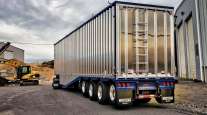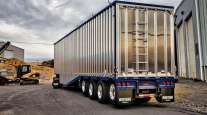Senior Reporter
August Net Trailer Orders Clear 12,000

[Stay on top of transportation news: Get TTNews in your inbox.]
U.S. trailer net orders in August reached 12,366, ACT Research reported as the persistent story of pent-up customer demand, various supply chains faltering and order boards opening partially, if at all, continued.
A year earlier, orders hit 28,139, according to ACT. But August did improve on July’s net orders of 8,128.
Frank Maly, director of commercial vehicle transportation analysis for ACT, noted the high-volume categories of dry vans and refrigerated units were responsible for the year-over-year weakness, while flatbeds and most other vocational trailer categories were in the black compared with last August.
August net US trailer orders of 12,336 units rose nearly 52% from the previous month, but were almost 57% lower compared to August of 2020. https://t.co/6YZFeFDBof#Trailers, #Transportation, #truck, #trucking pic.twitter.com/pbQ2RaE11U — ACT Research (@actresearch) September 22, 2021
“August flatbed orders came in double that of last year,” he said.
Chris Hammond, executive vice president of sales at Great Dane, told Transport Topics the total for August did not include a lot of its business because Great Dane stopped taking orders for 2021 before then, except for flatbeds — and those are now sold out for this year.
“Conditions are what they are. They haven’t changed,” he said. “We think the whole industry has continued to push their backlogs into next year, which has made it difficult to give guidance to our own sales teams as to what quantity of production is available to them.”
Hammond said in mid-September that Great Dane opened up directional pricing for the first two to three months of 2022 to start filling in the remaining holes as sales teams present quotes and meet with their fleets.
“As we get closer in, we’ll finalize what the pricing is. There is still a lot of fluidity in the cost side of things, as we have all seen in supply lines, materials, labor costs,” he said.
FTR pegged U.S. orders at 15,100.
“There is enormous demand for new trailers in 2022,” said Don Ake, vice president of commercial vehicles for FTR.
Trailer makers are not producing enough trailers in 2021, so pent-up demand grows every month, he said. “Freight growth is expected to be robust, rolling into next year. Fleets are desperate for more new trailers today, and they perceive an even greater need next year. When trailer makers begin booking at full throttle for 2022, there could be a record number of trailer orders for the month.”

Giesen
The strong demand matched with the industry’s reduced capacity appears to be here for the foreseeable future, said David Giesen, vice president of sales for Stoughton Trailers.
Stoughton has not yet opened up its order board for next year as there still is too much uncertainty in costing and availability of components, he said.
“But the chassis business has taken off,” Giesen said. “The demand is similar to that of trailers at this point. And parts sales remain strong. As fleets cannot get the quantities of new trailers they want, they are running the old trailers longer. This takes parts to keep the fleets rolling.”
In related news, Stoughton on Sept. 21 announced additional wage increases for production employees.
Stoughton raised the entry-level hourly pay for assemblers and painters $2 per hour to $18 and $20.25, respectively. It recently lifted starting pay for welders to $20 per hour. The new levels follow a wage increase in November.
The company set a goal last year of hiring an additional 300 employees.
Hyundai Translead Chief Sales Officer Sean Kenney said when the company has to inform customers it is out of this or short on that, “They kind of get it because they feel it in their own consumer lives everywhere they go.”
He said if shortages affected a larger aspect of the trailer, it has to be pushed out.
“We can’t build it. Or we will have to go to offline and build it as much as we can and finish it outside the factory, which is not ideal for us,” Kenny said. “It’s not ideal for the customer, either. They don’t want it that way.”
He said in mid-September that Hyundai Translead had not opened its order board for next year, but that was about to change.
Kenney said nailing down supplier component pricing is a challenge.
“We have looked at volume allocations for 2022 and started communicating some of those,” he said. “We are looking at how much we are going to produce, and there’s no way we could produce enough to satisfy the demand. Now, it’s who gets how many. We are trying to be as fair about it as possible.”
He said Hyundai Translead probably would open up quoting by the end of September for slots throughout 2022.
“It will be an avalanche of demand,” Kenney said.
Want more news? Listen to today's daily briefing below or go here for more info:




